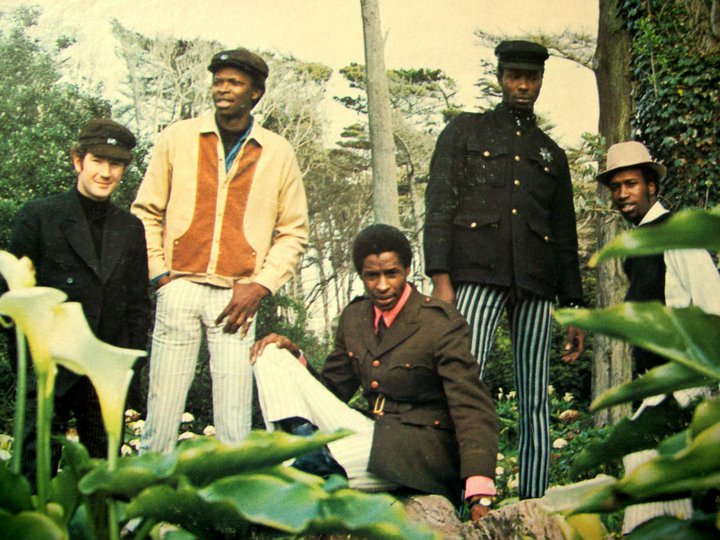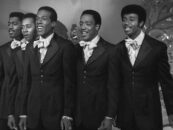George ‘Pops’ Chambers, of Chambers Brothers, Dies
by Jeff Tamarkin George “Pops” Chambers, the oldest of the musical family that together formed the American soul-rock band the Chambers Brothers, and earned their biggest success with the 1968 single “Time Has Come Today,” died today (October 12). The news was announced on the band’s Facebook page.
George “Pops” Chambers, the oldest of the musical family that together formed the American soul-rock band the Chambers Brothers, and earned their biggest success with the 1968 single “Time Has Come Today,” died today (October 12). The news was announced on the band’s Facebook page.
A brief post, presumably by George Chambers’ brother, Lester, stated, “To all our fans, friends and loved ones, I was informed this morning at about 5:00 am, that my brother George, known as ‘Pops’ Chambers, has passed. We thank you for all your years of Love Peace and Happiness.” It was accompanied by a clip of the band’s song, “Heaven.”
George Chambers, the oldest, was born Sept. 26, 1931, who sang and played the bass; Willie, one of the two guitarists, followed in 1938; Lester, who sang, played harmonica and tick-tocked the cowbell, arrived next, in 1940; Joe, the other guitarist, was the youngest, born in 1942.
For most rock fans, the Chambers Brothers were a new group when they scrambled up the charts with their breakout single and album in 1968, but they were already veteran performers. Originally from Carthage, Miss., the brothers had started out harmonizing in their church choir. By the early ’60s they’d migrated to Los Angeles, where they turned pro. They built a reputation as a formidable gospel quartet and managed to get decent gigs on the budding folk circuit, playing all of the popular festivals and coffeehouses. The king of folk music himself, Pete Seeger, got the brothers booked at the 1965 Newport Folk Festival and they were soon on their way.
Listen to the Chambers Brothers’ “Heaven”
With a drummer, Brian Keenan, on board—making the Chambers Brothers one of the first interracial bands in popular music—they discovered a niche that was equal parts contemporary soul and the new rock, exemplified to impressive effect on their debut album, People Get Ready, recorded live at the Ash Grove in L.A. and the Unicorn in Boston, and released on Vault Records in 1965.
They got the encouragement they needed from their new label, Columbia Records—they’d sung backup there on an unreleased version of Bob Dylan’s “Tombstone Blues”—which assigned the hot producer David Rubinson to the group. Rubinson latched onto a song composed by Willie and Joe, “Time Has Come Today,” and went immediately about the business of transforming the Chambers Brothers.
The first version, recorded in August 1966 and released as a single, failed to chart, and the Chambers Brothers couldn’t seem to catch a break for the next several months, although their live shows were quickly becoming legend for the spirit and intensity the singer-musicians brought to their brand of soul-rock. By the summer of 1967, psychedelia had become all the rage, with the arrival of Sgt. Pepper, Jimi Hendrix and the San Francisco bands. The Chambers Brothers had anticipated the music’s growth with their original “Time” single (which included the line “my soul has been psychedelicized”) and Rubinson decided to give the tune a second chance. That August he let the band loose in the studio to recreate the wild, elongated version they’d developed during their nonstop touring. This time, the brothers went all out. An extended jam was inserted into the recording: wailing electric guitars; spacey, acid-infused effects; tons of reverb; maniacal shouting. It slowed down, speeded up again, went off into the stratosphere. Even the cowbell was put through the studio’s battery of gizmos, echoing until it barely resembled a cowbell anymore. It was acid-rock at its most lysergic.
Listen to the full 11-minute version of “Time Has Come Today”
Rubinson placed the 11-minute reboot of “Time Has Come Today” at the tail end of the band’s debut Columbia album, similarly titled The Time Has Come. The LP overall offered a cross-section of the brothers’ strengths, including original material plus a few well-chosen covers—a replay of “People Get Ready,” Bacharach-David’s “What the World Needs Now Is Love” and Wilson Pickett’s “In the Midnight Hour”—but it was the over-the-top long version of “Time Has Come Today” that intrigued disc jockeys at the newly emerging FM rock stations, where the motto was the more psychedelic the better. Listeners started to catch on.
Columbia didn’t see “Time…” as a single at first. Although the Doors had hit #1 with a stripped-down version of their own supersized “Light My Fire,” Columbia went instead with “Uptown,” an uptempo gospel-fueled raver that landed the Chambers Brothers their first Billboard single in the fall of ’67, although it topped out at #126.
Finally, in December 1967, more than a year after the first version was recorded, an edited version of “Time Has Come Today” was released as a single. This time, the radio stations that couldn’t play an 11-minute version took the reins. The single finally charted in September 1968, taking an enormous leap on Sept. 21 from #61 to #20. It ultimately rose to #11, giving the Chambers Brothers the biggest hit of their career.
Related: Our feature on “Time Has Come Today”
The Chambers Brothers remained a top live and recording act into the mid-’70s, placing another eight singles on the Billboard chart (including a bang-up cover of Otis Redding’s “I Can’t Turn You Loose”). The album The Time Has Come began its ascent to #4 in early 1968 and was followed by A New Time—A New Day ((1968, #16), Love, Peace and Happiness (1969-70, #58), a greatest hits collection in 1970 and New Generation (1971, #145), before the Chambers Brothers left the world of the charts for good.
Eventually, Columbia dropped the band and although they signed with other labels and added/subtracted additional personnel to augment the siblings, they never regained their commercial hold. Today Lester Chambers performs on his own with his band the Mudstompers, while Joe and Willie still perform as the Chambers Brothers. George returned to singing gospel again in his later years. Original drummer Brian Keenan died in 1985.







No Comments so far
Jump into a conversationNo Comments Yet!
You can be the one to start a conversation.